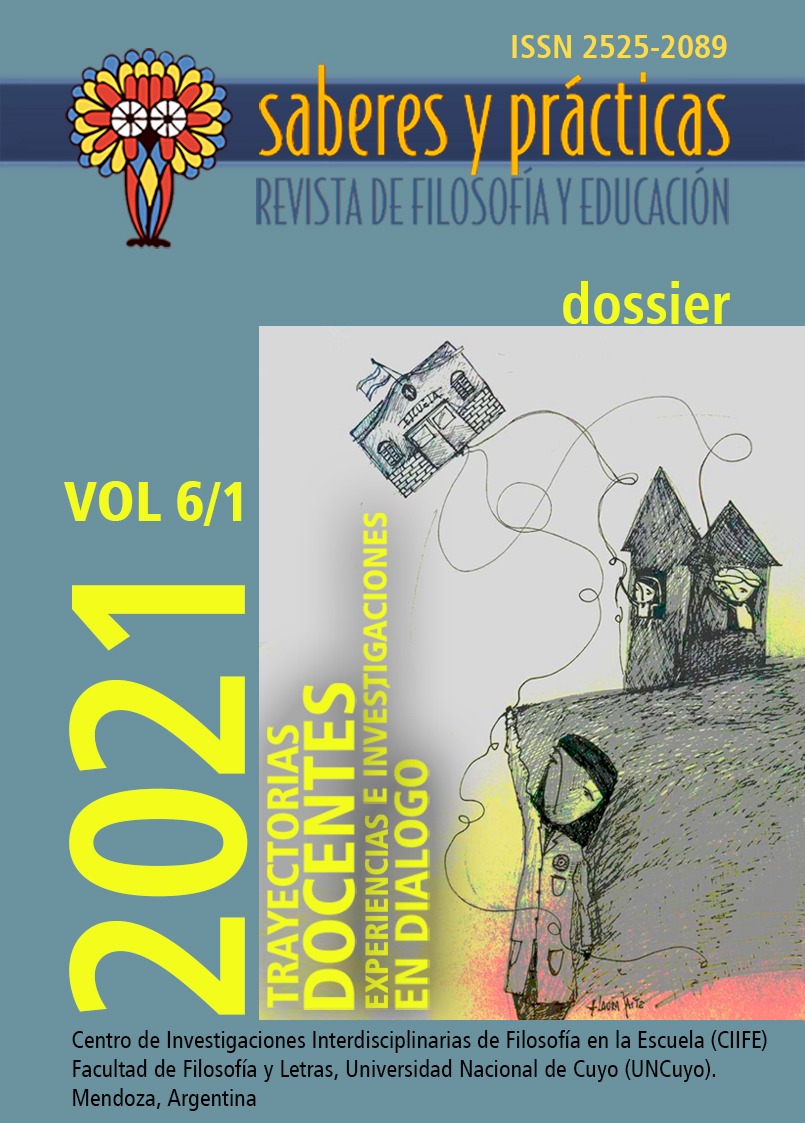To teach History in a health emergency context
melting of a classroom's walls and new spectators in classes
DOI:
https://doi.org/10.48162/rev.36.018Keywords:
education during the pandemic, Covid-19, virtual education, teaching performance during the pandemic, pedagogical narrativesAbstract
The outbreak of the Covid-19 pandemic in everyday life modified people’s lives and school has not remained unaffected. School institutions found themselves facing an unheard situation that implied a quick decision making and their modification on a daily basis. The learning was thus completely subverted and so it was the teaching approach.
We seek to reflect upon our personal experiences during the 2020 academic year that has just been through the most significant problematics. Here, we understand that the conversion of the classroom from a physical space into a virtual one challenged the teaching of History and the generation of meaningful learning while the lives of students was focusing on other worries.
The objective guiding this paper is to articulate our experiences as secondary school teachers concerning virtual learning during 2020 and to provide a theoretical frame to our teaching performance from a qualitative point of view.
Downloads
References
Connelly, F. Michael y Clandinin, D. Jean (1995). “Relatos de experiencia e investigación narrativa”. En: Larrosa, J. y otros, Déjame que te cuente. Ensayos sobre narrativa y educación. Barcelona: Laertes.
Doñate Campos, O. y Ferrete Sarria, C. (2019). Vivir la Historia: Posibilidades de la empatía histórica para motivar al alumnado y lograr una comprensión efectiva de los hechos históricos. Didáctica de las ciencias experimentales y sociales
Expósito, E., & Marsollier, R. (2020). Virtualidad y educación en tiempos de COVID-19. Un estudio empírico en Argentina. Educación y Humanismo, 22(39), 1-22. https://doi.org/10.17081/eduhum.22.39.4214
Freire, P. (2014). El grito manso. Siglo Veintiuno.
Meo, A. I. y Dabenigno, V. (2020). Teletrabajo docente durante el confinamiento por COVID-19 en Argentina. Condiciones materiales y perspectivas sobre la carga de trabajo, la responsabilidad social y la toma de decisiones. Revista de Sociología de la Educación-RASE, 14 (1), 103-127. http://dx.doi.org/10.7203/RASE.14.1.18221
OMS (2020): “Cronología de la respuesta de la OMS a la COVID-19” en Organización Mundial de la Salud (en línea). https://www.who.int/es/news/item/29-06-2020-covidtimeline.
Murphy, J. (2011). Más de 100 ideas para enseñar historia. Primaria y secundaria. Grao.
Rogero-García, Jesús (2020). La ficción de educar a distancia. Revista de Sociología de la Educación-RASE, 13 (2) Especial, COVID-19, 174-182. http://dx.doi.org/10.7203/RASE.13.2.17126
Rujas, J. y Feito, R. (2021). La educación en tiempos de pandemia: una situación excepcional y cambiante. Revista de Sociología de la Educación-RASE, 14 (1), 4-13.
Suarez, D. (2007). ¿Qué es la Documentación Narrativa de Experiencias Pedagógicas? Fascículo 2. En: Documentación Narrativa en experiencia y viajes pedagógicos. Colección de Materiales Pedagógicos. Ministerio de Educación, Ciencia y Tecnología. Buenos Aires.
Suarez, D. (2007). ¿Cómo documentar narrativamente experiencias pedagógicas? Fascículo 3. En: Documentación Narrativa en experiencia y viajes pedagógicos. Colección de Materiales Pedagógicos. Ministerio de Educación, Ciencia y Tecnología. Buenos Aires.
Published
How to Cite
Issue
Section
License
License
This work is licensed under a Creative Commons Attribution-NonCommercial-ShareAlike 2.5 Argentina License.









